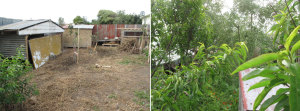 Principle 5: Use & value renewable resources & services
Principle 5: Use & value renewable resources & services
In this guest post, Tim Sparke teamed up with Richard Telford to write about how we can take advantage of the water that falls from the sky. We list some of the ways in which rainwater can be collected and stored to make use of it in and around our homes.
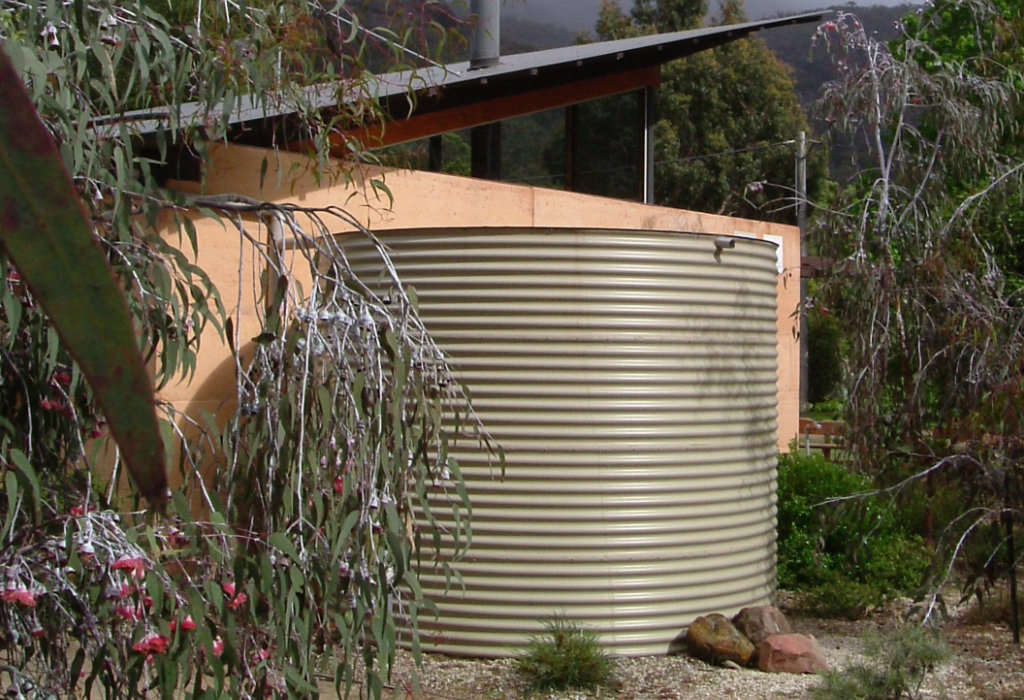
Rainwater is one of the most abundant resources nature has to offer and it’s often right on your doorstep. These days, it’s fairly easy to collect and can be used in a variety of ways to both benefit your life and help the environment. For instance, the benefits of rainwater harvesting include:
- Decrease your reliance on pipe water, helping to lower mains water demand
- By using rainwater, you’re connecting with the natural cycles of life, and enhancing your own connection
- You can live a lower impact lifestyle, and increase your resilience
Here are just a few straight forward ways you can use and harvest rainwater around the home.
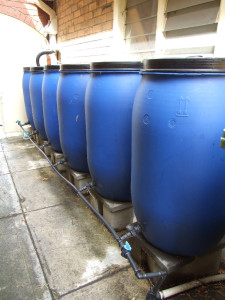
Collecting
The easiest way to start collecting rainwater is from a roof space to an old bath or large container. Think creatively and you may even do this in an apartment, provided you have space. Place drums near your drain pipes and install a diverter to collect the water from your house. If you have a garden, then think a little bigger and get a water tank – or you can join recycled drums together.
If you are consuming a lot of water then having a central storage unit, such as rain tank, is ideal. If you have the space, the bigger this is, the better, as you can store more water and open yourself up to more options.
If you need to ensure clean or pure water, then a filter system is a must. This is important when collecting rainwater in a tank, as leaves and other debris need to be filtered out first, to avoid a build up of sludge at the bottom of the tank.
Toilet Water
Rainwater is well suited for using with flushing toilets, much more so than grey water. A basic flywire screen to remove leaf litter is all that’s needed for filtering. You can install automated systems to fill the cistern, or you can just bucket it in. Of course, if you have a composting toilet you don’t need to flush any water at all!
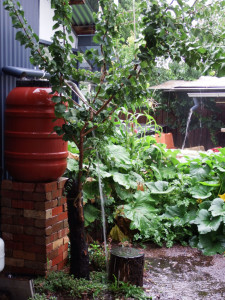
Gardening
Similarly, the garden is a great place for using rainwater. If you collect water into a bath it’s perfect for scooping up using a watering can. You can add liquid fertilsers or compost teas to boost plant growth.
If your tank is on a stand, you can take advantage of the extra pressure of gravity. You can use overflow from tanks to top up ponds, for fountains and other garden features you may have. These don’t need tap water and, in many instances, rainwater is better suited, as it is free of the chemicals in tap water that can harm or even kill fish. If you have been considering setting up your own backyard aquaculture system, then rainwater is a must.
One inexpensive way to make use of runoff is to build swales, or infiltration basins, which slow down the flow of water so that it has a chance to soak into the soil. Huge volumes of water can be stored in the soil this way, and it’s especially effective on sloping ground, where water would normal run off without getting the chance to soak in.
Drinking Safely
The Australian Department of Heath states “Water filters should not be necessary as a method for maintaining microbial, chemical or physical quality of rainwater. If problems occur, the preferred approach is to instigate remedial action to prevent contamination … rather than installing a system to treat symptoms of inadequate maintenance.”
Richard Telford and his family have been drinking pure rainwater for the last 5+ years, without filters and without any obvious negative effects. Regular maintenance of gutters and screens on their corrugated iron roof helps to ensure that the water coming into the tanks is clean. This could be improved further with the addition of first flush diverters, DIY or buy an off-the-shelf kit. These simple systems prevent the first 10 litres or so of rainwater going into your tank.
If you live in an area where air pollution or the roof catchment is a concern then there are ways to make rainwater safer to drink. Specifically, filters and purification devices are readily available and represent a good investment, especially if compared to bottled water.
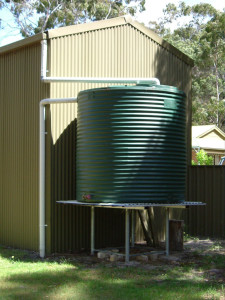
Washing
If you’re willing to set up collection tanks, filters and other means to clean rainwater, then it can also be used for a few more uses in the home. Cleaning and washing, for instance, can readily make use of good rainwater and, again, this helps cut down on your reliance of piped water. Washing uses a lot of water – especially in larger homes – so this is a good way to help the environment. Again, this water goes back into the system anyway, so you’re not holding resources or excessively diverting the natural cycle.
In fact, a strong argument can be made for using rainwater for washing in favor of tap water. Tap water often has additives, such as salts or preservatives that often have an adverse effect. Pure rainwater, on the other hand, has little minerals or other additives, making it ideal for cleaning. This can be used inside for laundry and dishes, but why not also use it outside when washing the car?
Advanced Equipment
Finally, while many of the aforementioned items can be done yourself, more advanced uses may require specialised equipment installed by professionals. The same applies if you start using rainwater in large amounts and wish to integrate it more closely with your home. This is where professional rain harvesting equipment is useful and, while daunting at first, it’s a strong investment that ensures you’re constantly helping the environment. These systems help collect rainwater and integrate it into your home. A hybrid tap system, for example, lets you use rainwater when it’s available but still gives you access to tap water when you need it.
As you can see, there are more than a few ways to take advantage of rainwater. When nature gives you a readily available resource on your own front door, why use chemically treated tap water? Rainwater can be filtered and purified for drinking, used for the toilet, gardening and cleaning. Reducing dependence on tap water builds resilience and reduces the demands on the local infrastructure.
So, what do you think of using rainwater? What are the most important uses of water to you? Share your ideas in the comments and tell us what you think.
 About the Author
About the Author
Tim Sparke is the CEO at 4 pumps and for several years, he has been an active advocate of organic farming and sustainability. He also has a passion for writing and he writes the blog at 4 pumps.
Photos and editing by Richard Telford. You can see a water audit of his property, Abdallah House, here.


